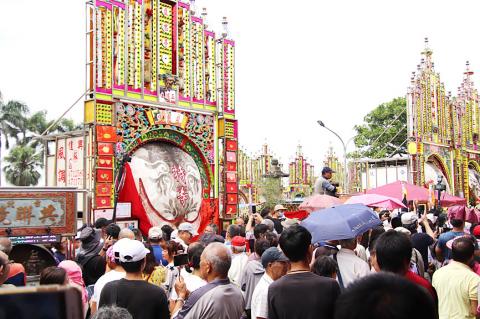Animal rights advocates yesterday staged a silent protest in Hsinchu County’s Sinpu Township (新埔) against what they called the inhumane treatment of “divine pigs,” usually the center-stage attraction for the Yimin Festival (義民祭).
The protest was launched after a petition by the Environment and Animal Society of Taiwan failed to convince the Hsinchu County Government to ban the competition, in which pigs are fattened and skinned for the ritual.
“Our protest is not targeting specific ethnic groups or temples, but the competition itself,” group deputy executive director Chen Yu-min (陳玉敏) said.

Photo: Huang Mei-chu, Taipei Times
The Yimin Festival, a major Hakka cultural event, has been tarnished by the divine pig competition, which has been continued by multiple temples on the grounds that it is an “integral part of Hakka culture,” the group said, adding that a 2016 Ministry of Culture report found that the competition does not contribute to the festival being an important part of Hakka culture and heritage.
Since as early as 2011, prominent Hakka people — including musician Lin Sheng-xiang (林生祥), writer Chung Chao-cheng (鍾肇政) and professor Lee Mao-sheng (李茂生) — have all said that equating the divine pig competition with Hakka culture is “a great affront to the Hakka people.”
Over the past 17 years, the group has called for one particular temple in Sinpu to stop rewarding behavior that abuses animals.
Of the 1,600 temples that used to hold divine pig competitions, only 11 — including the one in Sinpu — have insisted on continuing the tradition, the organization said.
Appeals have been made to the Hakka Affairs Council, the Council of Agriculture and other animal rights-related groups to stop or cancel the divine pig competition altogether, it said.
Religion and local beliefs should not be a shield for animal abuse, it added.
The competition has become for-profit, as people are hiring professionals to fatten their pigs and the professionals have adopted abusive methods to force-feed the pigs, such as tube-feeding, the group said.
Owner and buyers — fixated on the prize money — are completely oblivious to the emotional stress and physical discomfort of the pigs, many of which have difficulty standing or walking due to their obesity, it said.
The very action seeking to honor yiminye (義民爺), the deified figure representing Qing Dynasty militias that died in service of the empire, is disgracing them, it added.
The temples have said that the competitions are launched by the faithful “of their own accord.”

ALIGNED THINKING: Taiwan and Japan have a mutual interest in trade, culture and engineering, and can work together for stability, Cho Jung-tai said Taiwan and Japan are two like-minded countries willing to work together to form a “safety barrier” in the Indo-Pacific region, Premier Cho Jung-tai (卓榮泰) yesterday said at the opening ceremony of the 35th Taiwan-Japan Modern Engineering and Technology Symposium in Taipei. Taiwan and Japan are close geographically and closer emotionally, he added. Citing the overflowing of a barrier lake in the Mataian River (馬太鞍溪) in September, Cho said the submersible water level sensors given by Japan during the disaster helped Taiwan monitor the lake’s water levels more accurately. Japan also provided a lot of vaccines early in the outbreak of the COVID-19 pandemic,

Kaohsiung Mayor Chen Chi-mai (陳其邁) on Monday announced light shows and themed traffic lights to welcome fans of South Korean pop group Twice to the port city. The group is to play Kaohsiung on Saturday as part of its “This Is For” world tour. It would be the group’s first performance in Taiwan since its debut 10 years ago. The all-female group consists of five South Koreans, three Japanese and Tainan’s Chou Tzu-yu (周子瑜), the first Taiwan-born and raised member of a South Korean girl group. To promote the group’s arrival, the city has been holding a series of events, including a pop-up

TEMPORAL/SPIRITUAL: Beijing’s claim that the next Buddhist leader must come from China is a heavy-handed political maneuver that will fall flat-faced, experts said China’s requirement that the Dalai Lama’s reincarnation to be born in China and approved by Beijing has drawn criticism, with experts at a forum in Taipei yesterday saying that if Beijing were to put forth its own Dalai Lama, the person would not be recognized by the Tibetan Buddhist community. The experts made a remarks at the two-day forum hosted by the Tibet Religious Foundation of His Holiness the Dalai Lama titled: “The Snow Land Forum: Finding Common Ground on Tibet.” China says it has the right to determine the Dalai Lama’s reincarnation, as it claims sovereignty over Tibet since ancient times,

Temperatures in some parts of Taiwan are expected to fall sharply to lows of 15°C later this week as seasonal northeasterly winds strengthen, the Central Weather Administration (CWA) said today. It is to be the strongest cold wave to affect northern Taiwan this autumn, while Chiayi County in the southwest and some parts of central Taiwan are likely to also see lower temperatures due to radiational cooling, which occurs under conditions of clear skies, light winds and dry weather, the CWA said. Across Taiwan, temperatures are to fall gradually this week, dropping to 15°C to 16°C in the early hours of Wednesday